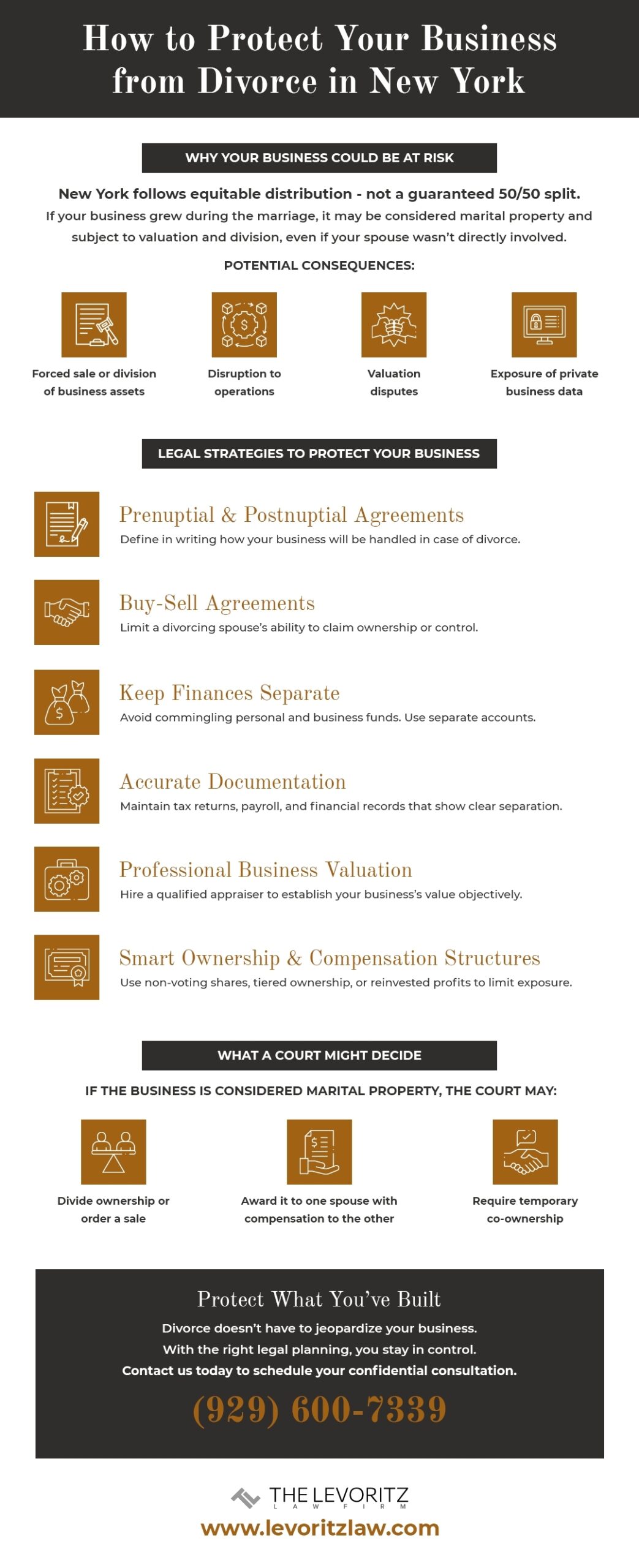Written by Yonatan Levoritz on August 19, 2025
In New York, business owners often find that divorce introduces more than just emotional complications. When a closely held company becomes part of marital discussions, the financial implications can be significant. Understanding how to protect your business from divorce is crucial if you want to avoid entangling your company in litigation or asset division. At The Levoritz Law Firm, we help Manhattan clients with substantial business interests put proactive legal measures in place to protect their operations.
Taking steps early can make a meaningful difference in safeguarding your business. A well-prepared prenuptial or postnuptial agreement is a practical first move, especially one that outlines how your business will be handled if a divorce occurs. It is also equally important to keep your personal and business finances separate, maintain thorough and organized records, and work with professionals who understand both family law and business operations.
New York applies equitable distribution in divorce, aiming for fairness rather than a 50/50 split. If your business was started or grew during the marriage, the court might see it as marital property. This classification could lead to your business being valued and partially awarded to your spouse, especially if they supported it or shared in its financial benefits.
Potential risks may include:
There are several legal strategies available to help protect your business from divorce, well before any marital issues arise. These include written agreements that define ownership and asset division terms.
One of the most effective ways to protect your business assets is through a prenuptial or postnuptial agreement. These agreements explicitly outline how your business holdings will be treated in the event of a divorce, ensuring it remains separate property. By addressing this matter proactively, you can mitigate potential disputes and safeguard your business interests.
According to the New York City Bar, a valid postnuptial agreement can override standard property division laws, putting you and your spouse in control of how your property is divided.
A buy-sell agreement can provide an added layer of protection for your business during divorce proceedings. By creating a legally binding agreement with other business partners or co-owners, you can establish predetermined protocols for handling a partner’s divorce. This agreement typically includes provisions preventing a divorcing spouse from interfering in the business and defining methods for distributing their shares.
Commingling finances is one of the fastest ways to unintentionally convert separate business assets into marital property. Courts in New York may consider a business a joint asset if both spouses benefit financially from it or participate in managing it.
Maintaining a clear separation between personal and business finances from the outset is essential. By avoiding mingling personal funds with business accounts and maintaining proper bookkeeping practices, you can strengthen your argument that the business is separate property during divorce proceedings.
Best practices include:

According to Section 202.16 of New York’s Uniform Rules for Matrimonial Actions, financial disclosure and valuation are critical components in divorce cases involving equitable distribution.
During divorce proceedings, having meticulously organized and accurate financial records can be instrumental in protecting your business assets. Ensure you keep adequate documentation that clearly distinguishes personal and business assets, including tax returns, financial statements, and business valuations. When your financial records are transparent and well-documented, it becomes easier to demonstrate the distinction between marital and non-marital assets.
Determining the precise value of your business is essential for equitable asset division. Engage a qualified business appraiser who can assess the worth of your business objectively. A thorough business valuation not only establishes an accurate monetary value, but it can also influence the final settlement, helping ensure a fair distribution of assets.
Your compensation structure and business ownership arrangement can affect how a court values and divides the business.
Consider structuring your compensation to minimize your spouse’s claim on your business. If possible, rather than relying on a traditional salary, explore alternative methods such as dividends, profit-sharing, or reinvesting profits into the business. Approach this aspect diligently and consult with a financial advisor and attorney to ensure compliance with tax laws and regulations.
Strategies may include:
If the court finds your business to be marital property, it could fall under New York’s equitable distribution rules. In that case, your spouse might be awarded a share, even without playing a role in running the business.
Several factors influence that determination:
Depending on these details, outcomes vary. The court might order a sale with divided proceeds, give one spouse the business with a payout to the other, or leave both parties as temporary co-owners.
In Manhattan’s high-asset divorce cases, judges usually aim to preserve the business’s stability while finding an equitable solution.
Owning a business takes constant attention. When divorce enters the picture, the stakes get higher. To protect your business during divorce, having an experienced legal team that understands how family law intersects with running a business is essential.
The Levoritz Law Firm supports New York City entrepreneurs who need to protect what they’ve built. Call us at (718) 942-4004 to schedule a private consultation. Let’s talk about a plan that keeps your business stable and your future on track.
Meet Yonatan Levoritz, the founder of Levoritz Law Firm, recognized for his exceptional skill in family law, his compassionate manner, and his commitment to achieving favorable outcomes for his clients. Yonatan Levoritz has a long record of winning challenging and complex cases.

This page has been written, edited, and reviewed by a team of legal writers following our comprehensive editorial guidelines. This page was approved by Founding Partner, Yonatan Levoritz who has more than 20 years of legal experience as a divorce & family attorney.